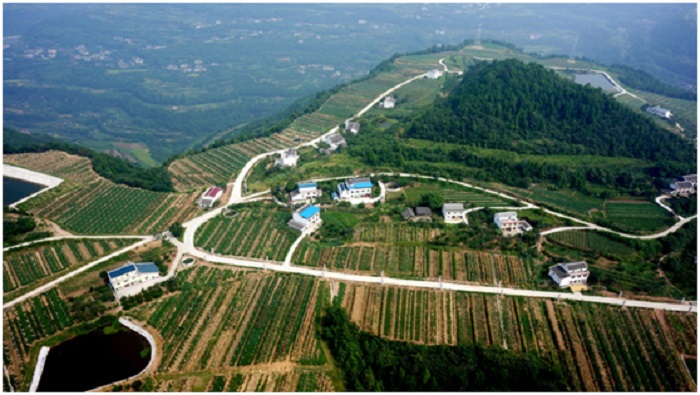



Cangxi county, Guangyuan city, southwest China’s Sichuan province, has achieved notable results in increasing residents’ income by promoting courtyard economy.
Since the 1980s, the county has been encouraging villagers to build small orchards, tea gardens, and fishponds, and plant various commercial crops on idle lands around their houses, which is known as the courtyard economy.
Local government has taken many measures to ensure that every household has the infrastructure facilities needed for developing courtyard economy, such as a sanitary water well, a small pool with a capacity of over 100 cubic meters, and a hardened road to the house.
In addition, Cangxi county has also promoted the construction of methane-generating pits and the upgrading of such facilities as livestock pens, toilets, and kitchens, laying a solid foundation for making the most of the space around people’s houses to plant fruits and vegetables while creating a pleasant living environment featuring birds’ twitter and fragrance of flowers.
Many rural households in Cangxi county have planted kiwi fruits on idle lands around their houses, with the combined planting area once reaching 5,000 mu (about 333.33 hectares), according to reliable statistics.
Besides kiwi fruits, people have also grown snow pear and walnut trees, as well as characteristic crops like Chinese medicinal plants, eventually making every village and each household have its own featured product or business.
So far, a total of 100,000 households in Cangxi county have engaged in courtyard economy, which increases the per capita annual income of the once-impoverished families by more than 5,500 yuan ($847).
“I see over 20 kilograms more walnuts in each of our trees next year,” Wang Libang, a resident in Changgang village, Yuedong township of Cangxi county, said happily while pruning walnut trees in his courtyard.
Courtyard economy is a great choice for Wang, as the man in his sixties is no longer suitable to become a migrant worker.
“Don’t you think less of the small pieces of land around people’s houses,” said Yang Jiarong, secretary of the Communist Party of China (CPC) branch of Linlang village, Hedi township of Cangxi county.
Some 50 percent of the once-impoverished households in Linlang village have planted kiwi fruit trees near their houses, Yang said, explaining that these trees could help increase the annual income of each of these households by 3,000 to 5,000 yuan, if calculated on the assumption that each family has grown 0.5 mu of kiwi fruits on average around their houses.
Zhang Fuquan, a once-impoverished resident in Zhiyuan village, Bamiao township of Cangxi county, thinks it a great idea to build a duck shed on the idle land in front of his house and have it connected with a methane-generating pit. “It’s both convenient and sanitary,” he said.
Zhang has built an environmentally-friendly duck shed covering an area of nearly 300 square meters with the help of a poverty-relief official named Chen Jichuan, who has also donated 150 ducklings to Zhang and invited technicians to provide the resident with guidance on duck farming.
“The feces in my duck shed can be directly disposed with the methane-generating facility constructed by the government. It’s easy and convenient for me to take care of the ducks as the shed is located near my home,” said Zhang, who now enjoys a more than 10,000 yuan increase in his annual income by raising ducks.
In recent years, Cangxi county has made efforts to promote the development of modern agricultural parks, and has brought the number of such parks covering an area of over 10,000 mu to 17. Still, courtyard economy in the county is thriving.
In an effort to lift the local courtyard economy to a higher level, Cangxi county has frequently invited expert groups from Sichuan Academy of Agricultural Sciences and Sichuan Provincial Department of Agriculture and Rural Affairs to further train local farmers in crop cultivation techniques.
Efforts have also been made to innovate livestock and poultry sheds and pens and new cultivation techniques like the techniques in the cultivation of virus-free seedlings.
The county has so far promoted techniques in soil testing for formulated fertilization among 75 percent of its rural population, popularized praticial technologies in farming in over 95 percent of its rural areas, and spread integrated techniques for the prevention and control of diseases, pests, and weeds among more than 85 percent of the farmers in the county.
Moreover, Cangxi county has formulated standards for eco-friendly and organic production of characteristics crops, including red-heart kiwi fruit, and introduced the identification of organic agricultural products to every household engaging in courtyard economy, thus bringing the proportion of local agricultrual products covered by quality traceability system to 85 percent.


The Humanitarian Service Diamond Awards has.
A Chinese Company, Inner Galaxy Steel.


The Programme Coordinator, Regulatory, Compliance and.


A Non-Governmental Organization (NGO), Committee for.
The Trustfund Pensions Limited has chided.


The House of Representatives Committee on.
The China General Chamber of Commerce.


Senator Chuka Utazi who represented Enugu.


An Abuja based Legal Practitioner, Ugochukwu.


The African business community in Yiwu,.
Leave a Comment